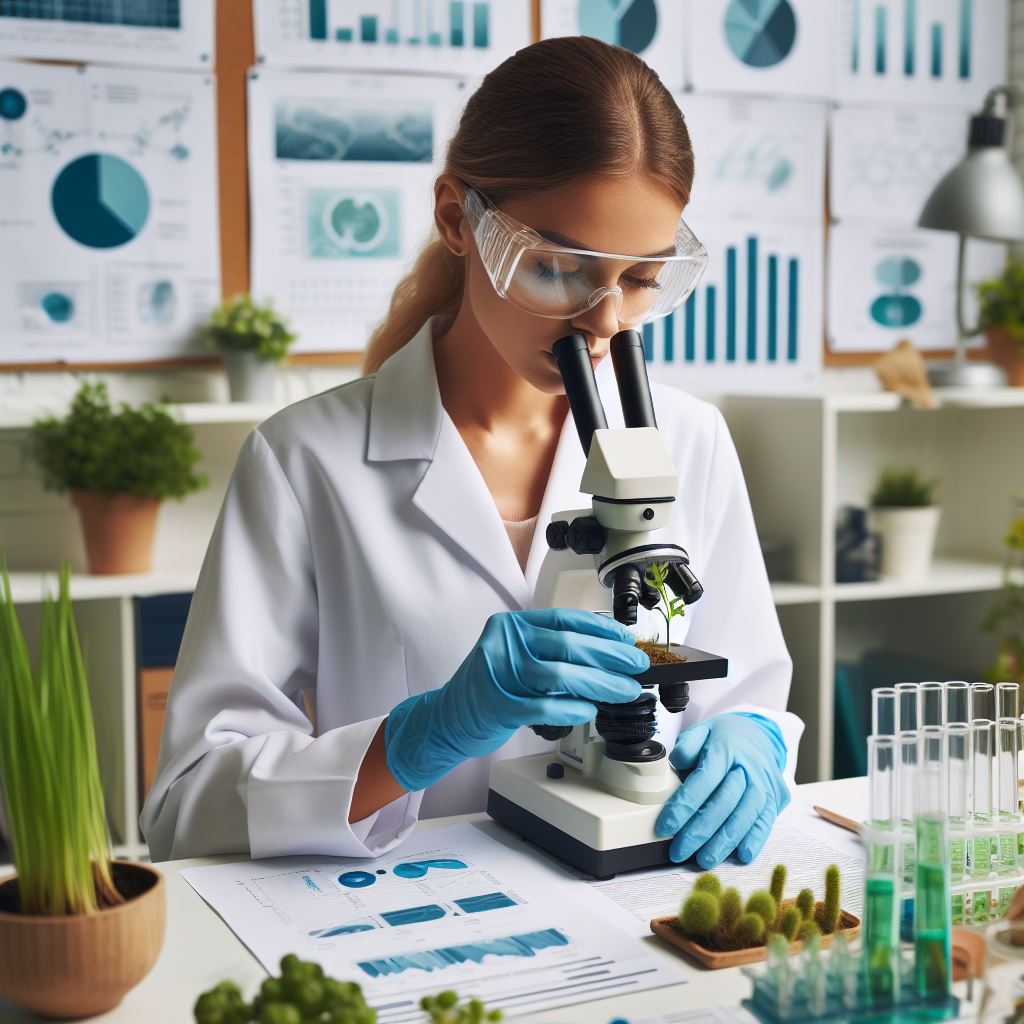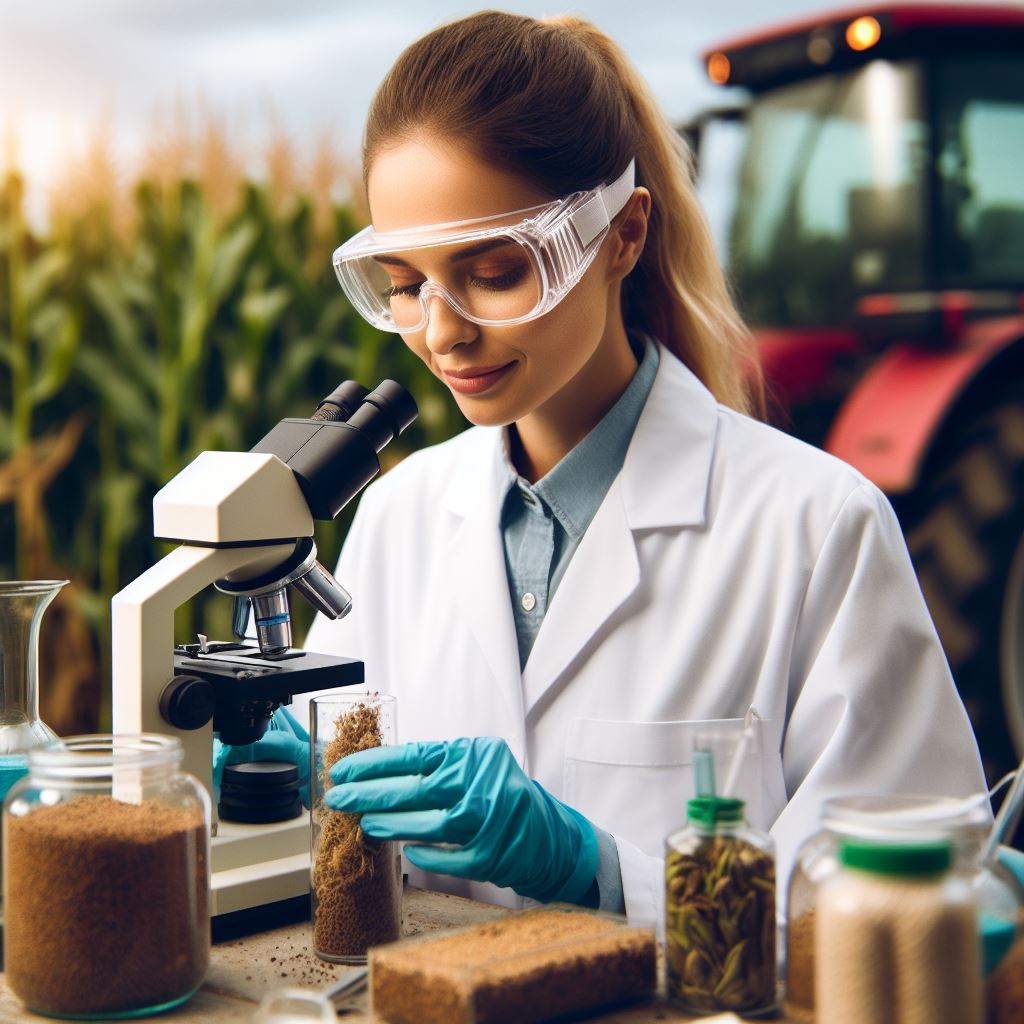Introduction
Agricultural scientists are indispensable figures within Australia’s agricultural sector, dedicating their expertise and efforts to propel the industry forward through innovative research and the development of sustainable farming practices.
Their multifaceted roles encompass a diverse range of responsibilities aimed at addressing key challenges facing the agricultural landscape, from enhancing productivity and efficiency to mitigating environmental impacts and ensuring food security for the nation.
Each day, these scientists embark on a journey of discovery and problem-solving, leveraging their knowledge in various scientific disciplines such as agronomy, soil science, plant pathology, and animal science.
Their work often begins with rigorous experimentation and data collection, conducted both in controlled laboratory settings and out in the field amidst the complexities of real-world agricultural environments.
In laboratories, agricultural scientists conduct experiments to understand plant and animal biology, soil composition, nutrient cycles, and the effects of different agricultural practices on crop yields and livestock health.
They utilize advanced technologies and analytical techniques to analyze samples, measure parameters, and gather insights into the intricate mechanisms governing agricultural systems.
Beyond the confines of laboratories, agricultural scientists venture into agricultural fields, farms, and rural communities to collaborate with farmers, extension agents, and other stakeholders.
They conduct on-site assessments, provide technical advice, and disseminate research findings to empower farmers with the knowledge and tools needed to implement sustainable practices and overcome agricultural challenges.
Driving Innovation and Sustainability: The Crucial Role of Agricultural Scientists in Australia
Moreover, agricultural scientists play a pivotal role in driving innovation and technological advancement within the agricultural sector.
They engage in applied research projects aimed at developing new crop varieties, improving pest and disease management strategies, optimizing irrigation and fertilization practices, and harnessing digital technologies and precision agriculture techniques to enhance farm efficiency and sustainability.
In addition to their research and development endeavors, agricultural scientists contribute to education and outreach initiatives, sharing their expertise through seminars, workshops, and educational programs aimed at building capacity and fostering a culture of continuous learning within the farming community.
Overall, the work of agricultural scientists is integral to the continued growth, resilience, and sustainability of Australia’s agricultural sector.
By tackling pressing challenges, generating new knowledge, and fostering innovation, they play a vital role in shaping the future of farming and ensuring the prosperity of rural communities across the country.
Educational background and qualifications
Embarking on the journey to become an agri scientist requires a solid educational foundation and specialized qualifications.
Aspiring agri scientists typically pursue degrees in agricultural science, biology, or related fields.
These programs provide fundamental knowledge in plant and soil sciences, crop production, and agricultural economics.
Educational Background and Qualifications
Additionally, coursework often includes subjects like genetics, microbiology, and environmental sustainability, crucial for understanding complex agricultural systems.
A bachelor’s degree in agricultural science serves as a stepping stone towards a career in agri science.
However, many professionals choose to further their education by pursuing advanced degrees such as master’s or doctoral programs.
Discussing the Educational Requirements
These higher levels of education provide in-depth training and research opportunities, allowing agri scientists to specialize in specific areas like agronomy, horticulture, or agricultural engineering.
In addition to academic qualifications, obtaining relevant certifications can significantly enhance an agri scientist’s credentials.
Highlighting the Importance of Specific Degrees and Certifications
Certifications such as Certified Crop Adviser (CCA) or Certified Professional Soil Scientist (CPSS) demonstrate expertise and proficiency in specialized areas of agricultural science. Continuous professional development is essential for agri scientists to remain competitive and effective in their field.
Mentioning Ongoing Professional Development
This may involve attending conferences, workshops, or seminars to stay updated on the latest research findings and technological advancements.
Additionally, participating in hands-on training programs or pursuing specialized courses can further enhance skills and knowledge.
Overall, a combination of educational background, qualifications, and ongoing professional development is vital for success in the field of agri science.
Overall, a strong educational foundation combined with relevant certifications and continuous learning paves the way to becoming a successful agri scientist.
Read: Tech Advances in Enviro Management: AU Focus
Job Responsibilities and Duties
- An agri scientist performs a wide range of tasks to improve agricultural practices.
- Conducting research and experiments to develop new methods for crop cultivation.
- Collecting and analyzing data to identify patterns and trends in agricultural production.
- Collaborating with farmers and agricultural organizations to understand their needs and challenges.
- Implementing innovative technologies to enhance productivity and sustainability in farming.
- Developing and testing new fertilizers, pesticides, and genetically modified crops.
- Evaluating the impact of environmental factors on crop growth and developing mitigation strategies.
- Identifying and managing diseases, pests, and other threats to agricultural production.
- Advising farmers on best practices for soil management, irrigation, and crop rotation.
- Assessing the economic viability of different agricultural methods and recommending cost-effective solutions.
- Monitoring and assessing the quality and safety of agricultural products.
Importance of Research and Data Analysis
- Research and data analysis are essential for driving innovation and improvement in agriculture.
- They help agri scientists understand the underlying principles of crop growth and development.
- Through research, scientists can discover new techniques to increase yield and reduce environmental impact.
- Data analysis allows them to identify trends and make informed decisions for sustainable farming practices.
- Research and analysis also contribute to the development of genetically modified crops that can resist diseases and pests.
- By studying data, scientists can assess the effectiveness of different agricultural interventions and optimize their impact.
- Research findings and data analysis help scientists disseminate knowledge and educate farmers on best practices.
- They also help policymakers develop evidence-based agricultural policies for food security and environmental conservation.
Role in Developing Sustainable Farming Practices
- Agri scientists play a crucial role in developing sustainable farming practices.
- They contribute to the reduction of chemical inputs by finding alternative methods for pest and disease control.
- By studying soil health and nutrient cycling, they promote sustainable soil management practices.
- Agri scientists develop and promote water-efficient irrigation techniques to conserve water resources.
- They work on enhancing crop resilience to climate change by breeding climate-smart varieties.
- Agri scientists also focus on optimizing resource utilization and reducing greenhouse gas emissions in agriculture.
- Through their research, they identify ways to minimize the environmental impact of agriculture.
- Agri scientists collaborate with farmers and agricultural stakeholders to implement sustainable farming methods.
- By developing sustainable practices, they aim to ensure long-term food security while preserving the environment.
- The role of agri scientists is crucial in addressing the challenges of global population growth and climate change.
Read: Renewable Energy in AU Farms: Enviro Impact
Typical work environment
The different settings where an agri scientist can work
As an agri scientist, I have the privilege of working in a wide range of settings.
Let me give you a glimpse into a typical day in my life.
Firstly, fieldwork is a crucial part of my job.
I often start my day by visiting farms and agricultural sites to gather samples, observe crop growth, and interact with farmers.
This hands-on experience helps me understand the on-ground challenges faced by the agriculture industry.
Conducting experiments is another significant aspect of my work.
In the field, I set up trials, manipulate variables, and collect data.
This allows me to study the impact of different techniques, fertilizers, or pest control methods on crop productivity.
When I’m not out in the field, I spend a considerable amount of time in the laboratory.
Here, I analyze soil, water, and plant samples to assess their quality and nutrient content.
These tests help me identify potential issues and provide recommendations for improving agricultural practices.
Office work also forms a vital part of my routine.
The fieldwork involved, such as visiting farms and conducting experiments
After collecting data and conducting experiments, I spend time in the office analyzing the information gathered.
This involves statistical analysis, data interpretation, and creating reports to communicate the findings effectively.
Collaboration is a key aspect of my profession.
I often work closely with other scientists, agronomists, and industry experts.
We brainstorm ideas, share knowledge, and discuss the latest research.
This collaborative environment fosters innovation and ensures that we stay updated with advancements in the field.
Continuous learning is a fundamental part of being an agri scientist.
In addition to staying updated with scientific literature, I attend conferences, workshops, and seminars.
The laboratory and office work, including data analysis and report writing
These events provide opportunities to network, share experiences, and gain insights from experts in the industry.
Since agriculture is a dynamic field, it is essential for me to stay abreast of technological advancements.
I explore the use of drones, satellite imagery, and precision farming techniques to improve the efficiency of agricultural practices.
Finally, a typical day as an agri scientist involves engaging with stakeholders such as farmers, policymakers, and industry representatives.
This interaction helps me understand their perspectives, concerns, and needs, allowing me to conduct research that is relevant and impactful.
Therefore, the work environment of an agri scientist is incredibly diverse.
From farm visits and field experiments to laboratory analysis and office work, each day brings new challenges and opportunities for learning.
It is a fulfilling profession that allows me to contribute to sustainable agriculture and make a positive impact on the food system.
Read: Soil Health: Top Priority for AU Enviro Experts

Explore Further: Forester Safety: Tips and Practices
Your Personalized Career Strategy
Unlock your potential with tailored career consulting. Get clear, actionable steps designed for your success. Start now!
Get StartedA Day in the Life
Start with a morning routine and getting to work
I wake up at 6 am, have a quick shower, and grab a cup of coffee before heading to work.
Describe the first tasks of the day, which may include reviewing data or attending meetings:
As I settle into my desk, I check my emails and prioritize my tasks for the day.
I review the data from ongoing experiments and make notes for analysis later.
Then, I attend a morning meeting where we discuss the progress of various projects.
Discuss any fieldwork or farm visits planned for the day
After the meeting, I put on my field boots and grab my equipment.
Today, we have a farm visit scheduled where we will evaluate crop growth and assess pest and disease management strategies.
I hop into my car and head towards the farm.
Talk about the collaboration with other professionals, such as farmers, biologists, and engineers:
At the farm, I meet with the farmer and his team.
We exchange ideas and discuss the challenges they are facing.
As an agri scientist, collaboration with different professionals is crucial for finding innovative solutions.
I also consult with biologists and engineers to address specific issues related to crop genetics and irrigation systems.
Mentioning the importance of ongoing research and experimentation
Back at the office, I analyze the data collected during the farm visit and brainstorm ideas for research.
Ongoing research and experimentation are vital in finding sustainable farming practices and improving crop productivity.
It excites me to contribute to the expansion of scientific knowledge in agriculture.
As the day progresses, I dive into conducting experiments in our lab.
I carefully follow protocols to ensure accurate results.
Sometimes, unexpected challenges arise, but overcoming them is part of the thrill of being a scientist.
Lunchtime is a chance to recharge and relax with colleagues.
We often discuss new findings or brainstorm ideas for future projects.
Networking and building relationships within the scientific community are essential for growth and collaboration.
In the afternoon, I attend a presentation by a visiting researcher.
Experience and Reflections: A Day in the Life of an Agri Scientist
These sessions expose us to different approaches and enable us to learn from their experience.
Keeping up with the latest developments is crucial in our field.
Towards the end of the day, I compile my findings and prepare a progress report for my team.
Clear communication is key to ensure everyone is on the same page and work progresses smoothly.
I also brainstorm ideas for future experiments and update my research plans accordingly.
As the sun sets, I head home, reflecting on the day’s accomplishments and planning for tomorrow.
Being an agri scientist is not just a job but a passion.
Every day brings new challenges, discoveries, and opportunities to contribute to sustainable farming practices.
In essence, a day in the life of an Aussie agri scientist is filled with a diverse range of tasks.
From morning routines to fieldwork, collaboration with professionals, ongoing research, and endless experimentation, our work revolves around finding innovative solutions that contribute to the advancement of agriculture.
It is a rewarding and fulfilling profession that constantly pushes us to strive for excellence in all aspects of our work.
Read: Biodiversity: Enviro Manager’s Role in AU
See Related Content: Enviro Management Trends in Australia’s Farms
Challenges and Rewards
Being an agri scientist comes with its own set of challenges.
One of the main challenges is dealing with unpredictable weather patterns.
Farmers rely heavily on weather conditions, and when they are unpredictable, it becomes difficult to plan and implement agricultural strategies.
Another challenge faced by agri scientists is limited funding.
Agricultural research requires significant investments in terms of infrastructure, equipment, and resources.
However, funding for research and development in agriculture is often limited, hindering progress in the field.
Despite these challenges, the job of an agri scientist is incredibly rewarding.
One of the most fulfilling aspects of the job is contributing to sustainable agriculture.
Agri scientists work tirelessly to find innovative solutions that promote environmentally friendly farming practices, reducing the impact on ecosystems and ensuring the long-term viability of agriculture.
Improving food production is another rewarding aspect of being an agri scientist.
Through research and experimentation, agri scientists develop new techniques and technologies that enhance crop yield and quality.
This not only helps feed the growing global population but also contributes to food security and economic growth.
Growing Opportunities: The Role of Agri Scientists in Advancing Agriculture
Moreover, working as an agri scientist offers countless opportunities for personal and professional growth.
The field is constantly evolving, with new discoveries and technologies emerging all the time.
Agri scientists have the chance to stay at the forefront of scientific advancements and make significant contributions to the field.
Agri scientists also have the opportunity to collaborate with experts from various disciplines.
This interdisciplinary approach fosters an exchange of ideas and encourages a holistic perspective towards agricultural challenges.
Such collaborations can lead to groundbreaking innovations and help address complex issues that require a multidimensional approach.
The job of an agri scientist is not limited to research alone.
They also play a crucial role in knowledge dissemination and education.
By sharing their findings with farmers, policymakers, and other stakeholders, agri scientists empower them to make informed decisions and implement sustainable practices.
To sum it up, being an agri scientist is a challenging yet rewarding role.
While the challenges, such as unpredictable weather patterns and limited funding, can be daunting, the rewarding aspects make it all worthwhile.
Making a positive impact on sustainable agriculture, improving food production, and the opportunity for personal and professional growth make this profession truly fulfilling.
Conclusion
In summary, this blog post delved into the dynamic daily life of an Australian agricultural scientist.
We explored the multifaceted nature of their role, spanning from conducting cutting-edge research to providing invaluable technical guidance.
Emphasizing their pivotal position as problem solvers and innovators within Australia’s agricultural landscape, we underscored the critical importance of agricultural scientists in driving sustainable farming practices and bolstering crop yields.
Encouragingly, we highlighted the immense opportunities for individuals considering a career in agricultural science.
By embarking on this path, aspiring professionals can actively contribute to the advancement and sustainability of the agricultural sector in Australia.
With a strong foundation in science and a passion for making tangible impacts, a career in agricultural science promises a fulfilling journey of meaningful contributions to food production and environmental stewardship.
Ultimately, for those with a fervent dedication to science and a drive to effect positive change, agricultural science emerges as an ideal career avenue.
It presents a gateway to shaping the future of agriculture in Australia, offering the chance to leave a lasting legacy of progress and innovation.
So, if you possess a penchant for scientific inquiry and a vision for a greener, more sustainable future, agri science beckons as a compelling and rewarding career choice.




